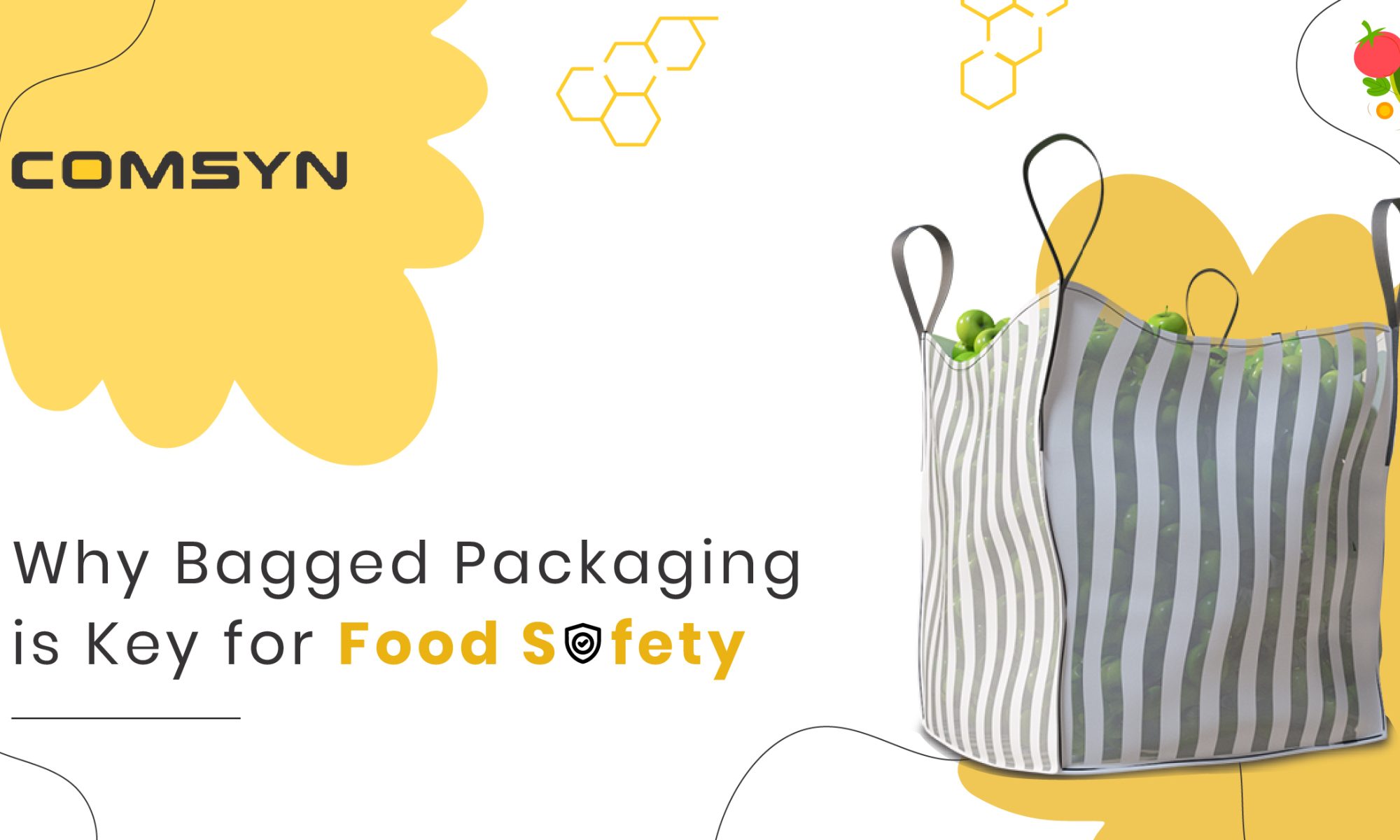COMSYN, a leading name in the packaging industry, is committed to providing packaging solutions intended to protect food from spoilage, and contamination, and, to a large extent, to keep them fresh from their manufacturing or processing until they are at the hands of the consumer. Bagged packaging uses special bags to protect, store, and transport food. The materials for these bags are generally specified by food safety and regulatory agencies. Common bagged packaging includes: Every type of bagged packaging serves a particular aim to protect the food product from any external environment damage and maintain maximum freshness. Bagged packaging carries certain benefits that are food safety and make it indispensable: One of the main functions of bagged packaging is to shield food against outside contaminants, which include dirt, dust, moisture, and pests. For instance, polypropylene bags and food-grade FIBCs have also been specially designed for this barrier from or against those contaminants for the safety of consumables. Air moisture and light are the primary causes of food spoilage. Bagged packages minimize those exposures to a minimum, thus retaining the natural taste, feel, and nutritional value of the food. Vacuum-sealed bags also take it one step further in preserving freshness; they suck out oxygen and create a vacuum seal, so there is less chance of spoilage. That is precisely why food-grade materials are required in the production of bagged packaging. For instance, food-grade FIBCs are manufactured under strict quality control conditions to protect them from contamination and to comply with international standards. Businesses that promote such packing practices show their concern for consumer safety. Bagged packaging makes food products easier to handle, transport, and store. Whatever the amounts, bulk or retail, this ensures that food is conveniently and safely managed through the chain of supply from production to final delivery to the consumer. The added advantages accrue not only to manufacturers and suppliers, thus minimizing damage to products. Although bagged packaging lends physical protection, labeling plays the second-most important role in food safety. Clear and accurate labeling on goods in bagged packaging provides vital information for both consumers and businesses. Clear labeling of bagged packaged goods ensures that all other details, including the ingredients, nutritional values, allergens, and shelf-life, can easily be communicated. All of that adds up, and consumers purchase products having reasonable expectations. Consumers need to know that the product they are purchasing is safe and meets quality standards not only from advertising but also from labeling. Throughout its lifetime, the package label will generally bear safety instructions about its storage conditions to safeguard its integrity. Bagged packaging is probably one of the most cost-effective food-packaging alternatives that will not only ensure the safety of food products but will also work to minimize operational expenses and minimize risks in food handling and storage. It gives a good return on investment since it guards food products against spoilage and cross-contamination for the full life of the product. Bagged packaging solutions that include polypropylene bags and food-grade FIBCs are both affordable and very durable. They are extremely good value in ensuring that food articles are safe and not contaminated throughout their shelf life. Using bagged packaging minimizes the shelf-life of the product and hence reduces the risk of it becoming spoiled or wasted. Companies can protect foodstuff from being contaminated, thus preserving its good quality. The result is higher profitability and sustainability. Food safety is ensured through reduced contamination, prolonged freshness, and adherence to food safety regulations through the use of bagged packaging. Easy handling and cost-efficiency add to its advantages, alongside the contribution to building consumer confidence through proper labeling. As food safety concerns rise globally, business enterprises should not hesitate to adopt dependable packaging alternatives that can help them surmount these hurdles. COMSYN is dedicated to developing the highest-quality bagged packaging products that promote safety, hygiene, and efficiency. Whether polypropylene bags or food-grade FIBCs are called for, along with other specialized packaging alternatives, COMSYN will offer you the product you require. To keep your food products safe, fresh, and ready for the market, connect with COMSYN today.Why is Bagged Packaging Key for Food Safety?

As food safety is an important issue throughout the world, the significance of safe and hygienic packaging can hardly be overstated. With the demand for processed and packaged foods expected to increase, businesses must prioritize packaging solutions for food safety and quality. In this regard, bagged packaging is coming out to be a game-changer.What is Bagged Packaging?
Why Bagged Packaging is Important for Food Safety?
Importance of Proper Labeling in Bagged Packaging
Conclusion
FAQ
Bagged packaging involves using specialized bags like polypropylene bags, food-grade FIBCs, or vacuum-sealed bags to store and protect food products.
Bagged packaging prevents contamination, preserves freshness, and complies with food safety standards using food-grade materials.
Yes, bagged packaging can be tailored to meet specific food storage, handling, and transportation requirements.
Labeling provides critical information like ingredients, nutritional value, and safety instructions, ensuring consumer trust and compliance.
Food-grade bagged packaging ensures hygiene, contamination prevention, freshness, and regulatory compliance for safe food handling.
- About Us
- Products
- Markets Served
-
- Investor Relation
- Board Of Directors
- Committees Of Board
- Corporate Governance
- Financials
- Annual Report
- Key Managerial Positions
- Shareholding Pattern
- Notices
- Policies Programme
- Announcements
- Statement of Investor Complaints
- Unpaid & Unclaimed Dividend
- Prospectus
- Investors Contact
- Subsidiary Financials
- IEPF
- Preferential Issue – 2024
- MOA & AOA
- Integrated Filing
- Sustainability
- Contact Us
- TechTex
- Brochure

